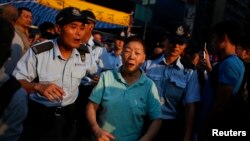The pro-democracy demonstration in Hong Kong is set to reach the two-week mark Friday as protest leaders meet for talks with top government officials.
The protesters want authorities to change the constitution to allow direct elections, but Beijing and its Hong Kong appointed leaders are against the move.
Student protesters have low expectations and some residents are growing impatient with their occupation of city streets.
Hong Kong's protest leaders have two demands to discuss Friday when they meet government leaders. They want the constitution changed to prevent Beijing's interference in elections and for the Beijing-appointed Chief Executive Leung Chun-ying to step down.
On the agenda
Hong Kong authorities agreed to discuss the constitution, known as the Basic Law, but the chief executive refuses to resign or put the issue on the agenda.
Pro-democracy protesters camped out in three parts of Hong Kong the past two weeks are expressing low expectations for the talks.
In a shopping area in Mong Kok district Wednesday morning, a few dozen protesters occupied the barricaded street under tents and umbrellas while police patrolled the area on foot.
An 18-year-old student protester, who called himself Dickson, said he has little hope the Friday talks will make progress.
“I’m actually not that optimistic. But, I think we need to stand up as I can see our freedom is becoming less. And, if we don’t speak up, I really think we don’t have another chance," he said.
A protester who called himself James has been camped at Mong Kok for the past two days. He said he was only slightly more hopeful the talks could help them reach their goals.
“Equally, equally, equally. That’s important. I mean, equally. If they don’t talk equally, that’s no use. The problem is still there," James said.
Heated exchanges
A group of older people opposed to the protest nearby held heated arguments with students that required occasional intervention by police.
At one moment, a student protester yelled, "I just don’t want you to touch me, OK?"
An anti-occupy protester replied, "You don’t want me to touch you? You’re touching my public space! This is a public space!"
Then student protesters began to sing "Happy Birthday," a peaceful tactic used by demonstrators to diffuse tensions.
The anti-occupy group complain the protesters are hurting local business and disrupting daily life. One man angrily tore down a protest poster taped to a bus stop.
Although some businesses appeared closed or have slower traffic, others were noticeably busy and said they were not affected at all.
Protester James said those opposed to the protest need to look at the bigger picture.
“Some inconvenience will be made. You see that no cars. The buses and the traffic. There will be some little bit inconveniences. But, I think if this short term inconvenience will give you a better future this (is) worth it," James said.
Concerns about protest
But many said they are worried that if there is no progress in the talks Friday, the protest movement could lose steam.
Thousands of people have been rallying in the evening as people get off work and join to show their support. But the numbers are lower than at the start of the protest last month and, during the day, amount to only a few hundred.
The protest materialized after Beijing in August announced a plan for a committee to first approve candidates for Hong Kong's first direct elections in 2017.
The move flies in the face of Basic Law article 26 that states anyone can stand for office and was denounced by democracy leaders as establishing a sham election.
When Hong Kong was handed back to China in 1997, it was promised the right to decide on directly electing its leaders as early as 2007.
But pro-Beijing politicians in Hong Kong twice postponed the election.
Many analysts said China fears allowing genuine democracy to flourish within its borders as it would likely be a challenge to the ruling communist party’s authority.
'One country, two systems'
China does not acknowledge criticisms that it has gone back on pledges for direct elections.
In Beijing Wednesday, Vice Foreign Minister Li Baodong told reporters that China's "one country, two systems" model will continue to play a pivotal role in Hong Kong.
"Hong Kong is an internal affair of China's and we have long opposed any foreign interference in Hong Kong's internal affairs. This position has not changed," Li said. "Hong Kong's continued prosperity and stability is in the interest of all parties and we believe that Hong Kong's future will be even brighter."
The protests are the biggest challenge to Beijing's rule over Hong Kong since Britain handed the territory back to China.




